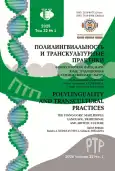Культурологический подход в интегрированном обучении марийскому языку и культуре
- Авторы: Константинова В.В.1
-
Учреждения:
- Марийский государственный университет
- Выпуск: Том 22, № 1 (2025): ФИННО-УГОРСКИЙ НАРОД МАРИ: ЯЗЫК, ТРАДИЦИОННАЯ И ХУДОЖЕСТВЕННАЯ КУЛЬТУРА
- Страницы: 190-197
- Раздел: Билингвальное образование
- URL: https://journal-vniispk.ru/2618-897X/article/view/326882
- DOI: https://doi.org/10.22363/2618-897X-2025-22-1-190-197
- EDN: https://elibrary.ru/IASIRV
- ID: 326882
Цитировать
Полный текст
Аннотация
Возникновение новых подходов и их использование в обучении и воспитании подрастающего поколения является ответом образования на социальный заказ общества. Каждый из подходов имеет методическую ценность, поэтому активно используется в системе российского образования. Не исключением является и методика обучения марийскому языку, которая находится в поиске наиболее эффективных подходов обучения. Это связано с уменьшением количества часов в учебном плане, а также с падением интереса подрастающего поколения к родному (национальному) языку. Современная методическая наука анализирует потенциал методологических подходов и методов для организации процесса обучения языкам. В исследовании рассматривается вопрос использования культурологического подхода при организации интегрированного обучения марийскому языку и культуре. Данный подход способствует осмыслению процесса обучения марийскому языку на материале культуры марийского народа. Культурологический материал формирует у обучающихся уважение к народу мари средствами языка и культуры. Интегрированное обучение реализуется во многих общеобразовательных организациях Республики Марий Эл. Выбор данного подхода при интегрированном обучении марийскому языку и культуре объясняется тем, что содержание учебного материала наполняется культурологическим материалом. В процессе изучения языка обучающиеся знакомятся с культурой марийского народа. Такой материал активизирует познавательный интерес обучающихся к изучению языка. Цель исследования - рассмотреть педагогический потенциал культурологического подхода для организации интегрированного обучения марийскому языку и культуре. Материалом исследования послужили научные работы зарубежных и отечественных исследователей об использовании культурологического подхода в обучении языкам, а также учебные программы и пособия по марийскому языку в контексте проблемы исследования. На основе результатов экспериментального исследования сформулированы выводы о целесообразности использования культурологического подхода для организации интегрированного обучения марийскому языку и культуре.
Об авторах
Валентина Васильевна Константинова
Марийский государственный университет
Автор, ответственный за переписку.
Email: mar.pedago9g@gmail.com
ORCID iD: 0009-0009-0990-187X
SPIN-код: 1372-0880
Scopus Author ID: 56610069500
доцент, кандидат педагогических наук, доцент кафедры педагогики начального и общего образования
Российская Федерация, 424002, Йошкар-Ола, пл. Ленина, д. 1Список литературы
- Konstantinova, V.V. 2024. “Methods of teaching the Mari language: formation and current state.” Modern problems of science and education, no. 3. (In Russ.). 5 Oct. 2024, https://science-education.ru/ru/article/view?id=33528 (accessed: 05.10.2024). https://doi.org/10.17513/spno.33528 EDN: ZWQGFX
- Pedagogical encyclopedic dictionary. 2003. Moscow: The Great Russian Encyclopedia: Bustard. EDN: QSZTJR Print. (In Russ.)
- Guzikova, M.O., and P.Yu. Fofanova. 2015. Fundamentals of the theory of intercultural communication. Yekaterinburg: Ural University. EDN: UWNSUV Print. (In Russ.).
- Locke, D. 1988. Essays in three volumes, vol. 3. Moscow: Mysl’ publ. Print. (In Russ.).
- Helvetius, K.A. 1938. About a man, his mental abilities and his upbringing. Moscow. Print. (In Russ.).
- Disterveg, F.A.V. 1956. Selected pedagogical writings. Moscow: Еducational and pedagogical publishing House. Print. (In Russ.).
- Bondarevskaya, E.V., and S.V. Kulnevich. 1999. Pedagogy: personality in humanistic theories and educational systems. Moscow–Rostov-on-Don: Teacher Creative Center. Print. (In Russ.).
- Sample programs for the implementation of language rights and ethno-cultural needs of students: a teaching aid for grades 1–3, 6–10. 2016. Yoshkar-Ola: Mari Institute of Education. Print. (In Russ.).
Дополнительные файлы









